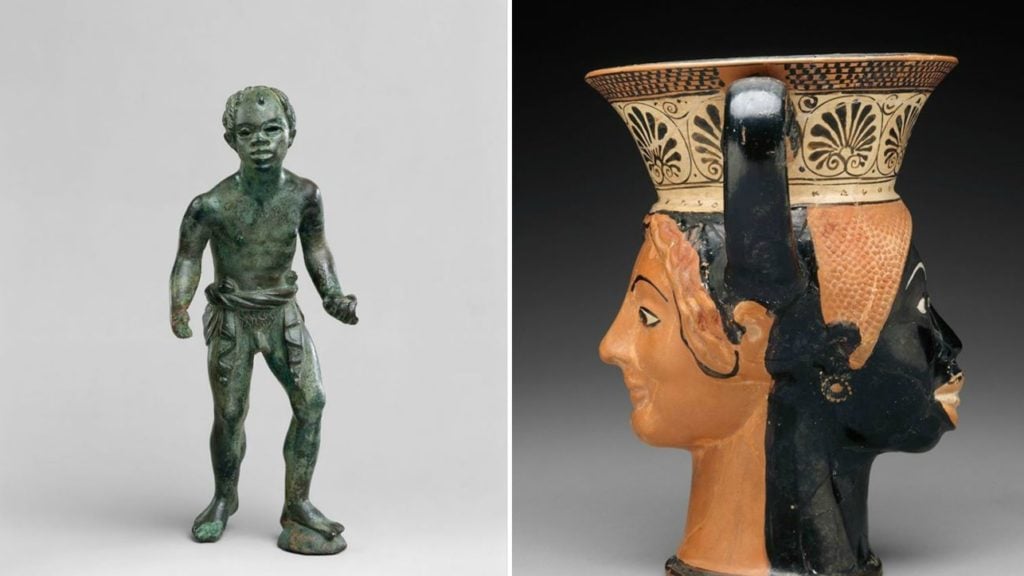Anthropology
Related: About this forum'Black' Africans and the Ancient Greeks

Dean Kalimniou
15 June 2020 10:14am
As a result of George Floyd’s murder and the rise of the Black Lives Matter movement, there have been calls to decolonise the academic fields of Classical and Byzantine Studies. For the edification of those mystified as to the connection between these seemingly arcane fields and the problem of systemic racism, it is argued that historically, these fields of study have been dominated by a western European discourse that, in the case of Classical Studies,, appropriates them from their natural context, presenting them as the foundation of “western” civilisation, asserting the primacy of that civilisation and by consequence, culturally and ethnically dispossessing the modern inhabitants of the lands in which they were engendered from that lineage.
Since Gibbon, in the case of Byzantine studies, false narratives of white supremacy and western superiority have also been propagated, portraying the Greek and Syriac speakers of Byzantium especially as effete and morally corrupt, while presenting the entire history of that civilisation as a debased and illegitimate form of the ancient Greek ideal that the West claims as its own. This form of Orientalism has caused an ontopathology of self-loathing and insecurity among peoples in the Empire’s successor states. In the case of the modern Greeks, it has resulted in the West colonising our own historical narrative and denying them the opportunity of viewing the linear progression of their history within the context and unique perspective of their own native tradition.
The well-worn cliché, propagated by western classicists and parroted by thousands of Greek school teachers around the world, that “ancient Greeks were blonde and blue eyed,” (and that by inference, the darker one is, the less Greek and the less worthy one is also)” embeds a racist discourse that was completely alien to the way ancient Greeks viewed people of colour. If Classical Studies are to be indeed “de-colonised,” a good starting point would be this simple proposition: That the ancient Greeks had no concept of racial superiority based on the colour of a person’s skin and that consequently, the relationship between ancient Greeks and peoples of colour, especially in Africa, was one of enduring curiosity, admiration and fascination.

Janiform kantharos with heads of a male African and a female Greek, ca. 480–470 B.C. African artists used specific hairstyles to convey a figure’s class, religious affiliation or social standing, but this Greek artist relied on racial stereotypes. The subjects may represent Herodotus’s theories of racial difference or a display of slaves and female companions in the service of Greek men.
That is not to say that ancient Greeks did not notice difference in colour. Having encountered Africans during the process of setting up colonies on the North African coast, and later confronting them in the Persian army that invaded Greece (Africans were among the soldiers said to have fought at Marathon), the ancient Greeks employed a number of terms to describe them, generally referring to them as “Ethiopians,” and using various terms to describe the colour of their skin, Hesiod referring to the physiques of the «????έ?? ἀ???ῶ?» (dark-skinned men), and Aristotle, to those «?ὸ ?ὴ? ??ό?? ???ά???» (those with dark skins). Archaeological evidence suggests that Greeks encountered Africans at a very early time in their history; one is portrayed on a mask found in a Bronze Age tomb in Cyprus. Homer casts Eurybates, Odyssey’s herald as an African, describing him as «?ὐ???ά?????» (wooly-haired) and «?????ό?????,» (dark hued), and states that Odysseus honoured him above his other comrades. As a hero, he is depicted on a shield in a 5th century vase painting. Africans appear also in depictions of worshippers of Demeter and Persephone in Acragas, suggesting that there was no colour bar to participation in ancient Greek religious rites.
More:
https://neoskosmos.com/en/167708/black-africans-and-the-ancient-greeks/
kurtcagle
(2,308 posts)It's worth noting that the Minoans were likely originally sea-faring Canaanites from the early third millennium that ended up settling in Crete, the Peloponnesian islands, and Rhodes before making their way West and South, while the Mycenaeans were more than likely originally Scythians. Given that the Carthaginians (the Phoenicians) combined a mercantile empire with occasional sea raids (such as the ones that hit Egypt in the period between 1150-1250 BC) it is likely that the Phoenician "empire" likely was "swarthy", especially once they colonized Carthage in the late ninth century. The Mycenaeans may very well have been blonde-haired and blue-eyed, though the Minoans were most certainly not, and even after the invasion of Crete by the Mycenaeans in the 16th century BC after the eruption of Thera, it is likely that the Aegean Greeks likely were not that dissimilar in appearance to present-day Greeks.
It's also worth noting that the Etruscans were likely also a Phoenician colony. The Etruscans were generally described as darker-skinned and more than likely may have also been not that distinct from the Graeci, supposedly Hellenic peoples who lived on the northern shores of the Ionian Sea (and where the Roman word for Greek comes from). A Phoenician colony from Rhodes or Crete most likely would have been speaking Hellenistic Greek by that point, but would also likely have been fortified by ships coming from Carthage (where the Phoenician colonists interbred with the Berbers for centuries, eventually leading to the Moorish invasion of Spain in the first Millennium AD), and ultimately the Black Irish.
And yes, neo-Classical History has a lot to answer for.